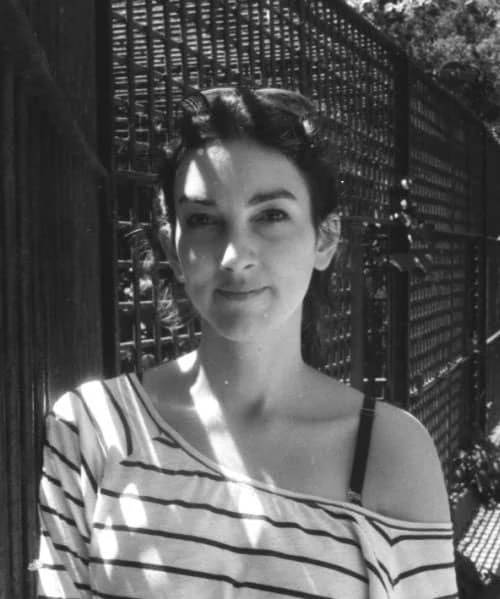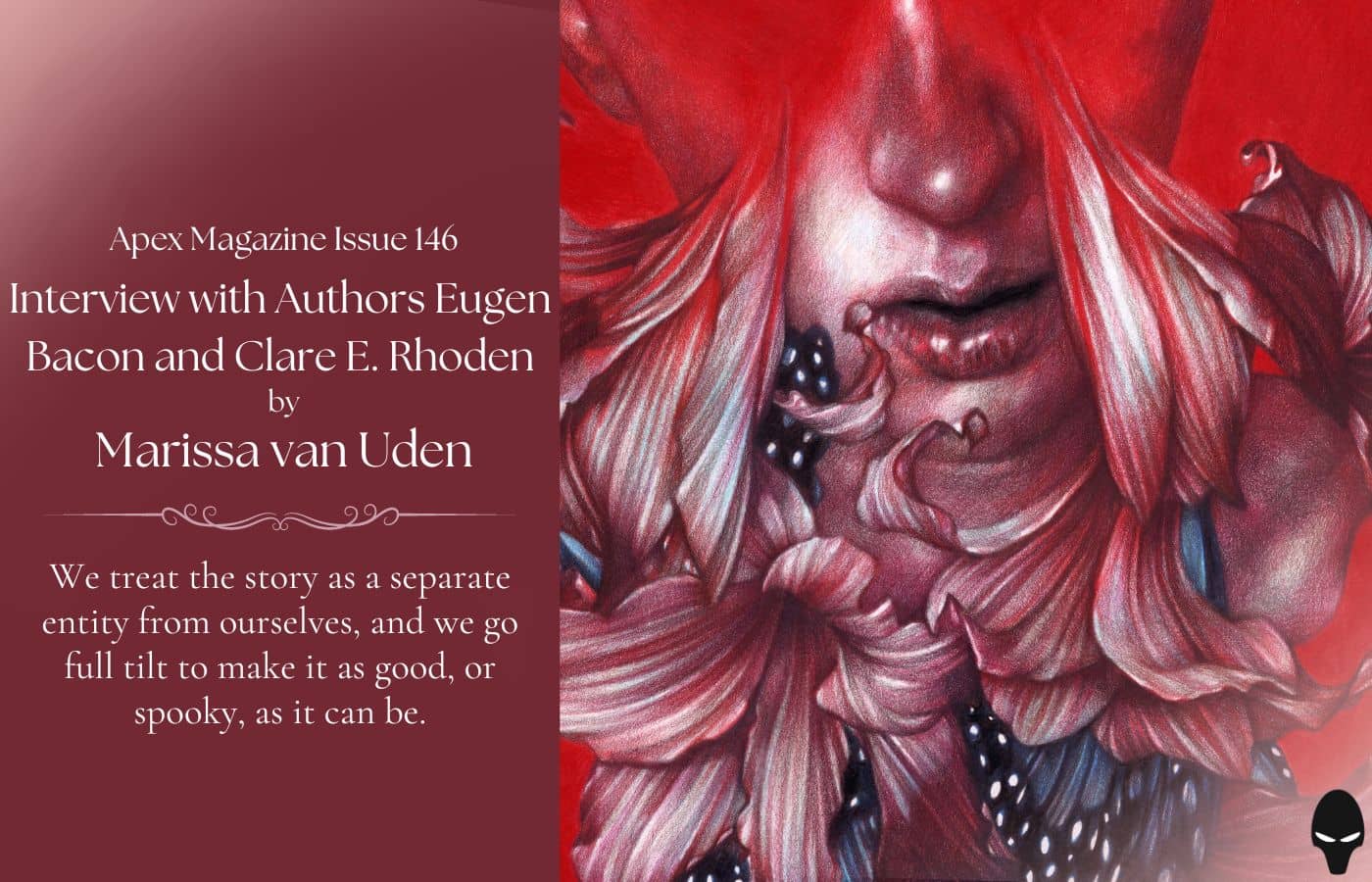
“Kizimbani,” by Eugen Bacon and Clare E. Rhoden, is a surreal story about a traveler, Luna, who finds herself crash-landed and stranded alone in a very strange place. After taking shelter in one of the empty buildings nearby, she starts to feel that she may not be alone after all … that there may be others watching her, invisible people passing through the same rooms where she dwells, calling her name and even leaving mysterious banquets overnight. Even the place itself shifts and warps, adding to the sense of disorientation and unreality. The only solid thing Luna has is a series of letters she writes to her love, hopeful of being reunited one day. But even they may not be safe from the mysterious happenings of Kizimbani.
Eugen Bacon is an African Australian author. She’s a British Fantasy and Foreword Indies Award winner, a twice World Fantasy Award finalist, and a finalist in other awards, including the Shirley Jackson, Philip K. Dick Award, as well as the Nommo Awards for speculative fiction by Africans. Eugen was announced in the honor list of the Otherwise Fellowships for “doing exciting work in gender and speculative fiction.” Danged Black Thing made the Otherwise Award Honor List as a “sharp collection of Afro-Surrealist work.” Visit her at eugenbacon.com.
Clare Rhoden lives on Bunurong land in Victoria, Australia. A born nerd, she reads endlessly. Clare’s short fiction has appeared in several anthologies and her WWI novel The Stars in the Night (Odyssey Books, 2019) is based on her family's South Australian history. Clare's dystopian trilogy The Chronicles of the Pale features talking wolfdogs and bionic humachines. Her most recent novel is How to Survive Your Magical Family (2022), perfect for cat lovers from 11 to 111. Find her at clarerhoden.com.
Marissa van Uden: Thank you both for joining us for what I think is our very first interview with co-authors! I’m excited to learn more about that, but first let’s talk about "Kizimbani." It’s such a strange and surreal piece—it has a very psychedelic quality, with Luna’s reality constantly shifting and changing, and nothing ever quite what it seems. Could you talk a little about where the idea for this story and place came from, and how it developed from there?
Eugen Bacon: I wanted to write a story about a lost place, a protagonist’s experience of finding themselves in this setting with its own strange history and where weird things happen. You know how some stories talk to you strongly and almost write themselves? This was one such story, but it also nudged me with a strong sense that it was a collaboration. I’ve co-written dark stories with Clare Rhoden before—she outwardly presents as calm and sweet but her inner mind is lethal when it comes to unsettling fiction! She was my immediate go-to.
Clare E. Rhoden: When Eugen first sent me Luna’s story, I fell into it like stepping off a cliff into a surreal next-door universe. The lost place and the bemused character lured me with weird potential. Would I like to collaborate? Would I!
MVU: In the essay “Collaborating With Others” for our Reach Your Apex educational branch, Eugen mentions that you have both worked together on two other stories: “Paperweight” published in the This Fresh Hell anthology, and “The Zanzibar Trail,” in Eugen’s collection A Place Between Waking and Forgetting (out this September 2024 by Raw Dog Screaming Press). It sounds like you make a great team! What do you love about working with each other most? And how do you organize your collaborations: do you each have a certain role, and do you take turns to email the file back and forth, or do you work on a shared document online?
CER: We talk—via email or text—almost daily and sometimes several times in the one day, so we often spark ideas and finish each other’s sentences anyway. I had a lot of experience collaborating on text when I was working in academia: in places like that, an individual’s contribution can be lost, diluted or ignored, and often goes unacknowledged. Writing with Eugen is so different. It’s like flinging the curtains wide and letting in the sun. Her energy is infectious, and boundless.
Another important side to this writing relationship is that we don’t hold back, and we don’t take offense. We treat the story as a separate entity from ourselves, and we go full tilt to make it as good, or spooky, as it can be.
I love that our collaboration works like conversation. Our chats are awesome!
 Aeryn’s name is Irish and means life force
Aeryn’s name is Irish and means life force
EB: Collaboration is like a marriage—you need the right chemistry together. In each of the stories, I was the wooer. Poor Clare, she is so gullible! Says yes immediately. Writing with Clare is effortless. She shares my work ethics, her turnaround is superb, and she always brings something new to the text.
I shared my early thoughts about “Kizimbani” with Clare and sent her a draft with lots of placeholders and a request to “add some spook.” By Jove, she did!
We emailed back and forth which, in hindsight, is a bit inefficient than a shared online doc. But email has that personalized feel of an ongoing conversation with a friend. We had an iteration of writing: Kizimbani take 1, 2, onwards. On take 2, Clare replied, “Here you are, my first run at it.”
I looked at it and shot back: “I love it! You’re a genius. Here’s the next one.”
On and on … We were elated with the outcome.
MVU: What do you find challenging about working in collaboration, compared to working alone?
EB: Seriously, there’s no challenge working with Clare. I reiterate her turnaround and quality are superb. We respect each other deeply and trust each other’s feedback. She’s one of my best collaborators.
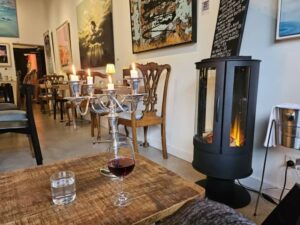 Eugen Bacon’s culinary explorations and research
Eugen Bacon’s culinary explorations and research
CER: I find the process of collaboration with Eugen inspiring, so it’s not much of a challenge—except that I have so many words springing into my head that I have to write them immediately—and, you know, life gets in the way! It’s such a rewarding collaboration. Definitely the best of my experience across several (ahem) decades.
MVU: What is one of your favorite pieces of writing advice that you feel has informed your own writing?
EB: Edit, edit, edit.
Both Clare and I are writers, reviewers, and editors, and always approach our work as first readers. We’re perfectionists, our harshest critics. We know that, once the work is out in the world, we have no more control of it, how the reader will connect with it or interrogate it.
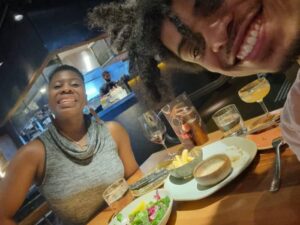 Culinary inspiration - Eugen on Mother's Day with her son
Culinary inspiration - Eugen on Mother's Day with her son
CER: Write, don’t edit at the same time.
Ideas are very, very precious, and it’s important to get them down. I keep telling myself to do just that, even though I know my internal editor is squinting over my shoulder all the time. Sometimes it’s hard to proceed, because I want a specific word that won’t come. I’ve learned to put, e.g., [tricked] when the word I want is “deluded,” and press on. It’ll come in the next pass. My second trick (am I allowed two?) is to put a time limit on writing. Even ten minutes can then be productive.
MVU: Once you have the seed idea for a story, how long does it usually percolate before it’s time to start writing it. When do you know you have a story and it’s time to write, or do you discover that on the page?
EB: I can’t sit on a story. It burns, scorches every which way. Keeps me tossing at night until I sit up and scribble the idea, then I can sleep. I’m an immersive and experimental writer, and unfold most short stories in my head or on screen as I go. My characters write their own stories, astonishing me in the process.
CER: I keep a list of words and ideas, and pull them out when the time seems right. Some story ideas take a while to mature. If it's an emotional subject, the story might stay in the shadows for years. Others roll themselves out like a carpet and all I have to do is follow along the steps. I find most stories write themselves. I’m not a plotter. I let the stories go where they want to.
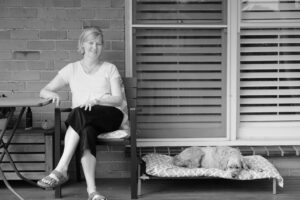 Clare Rhoden and Aeryn the Spoodle
Clare Rhoden and Aeryn the Spoodle
MVU: What artists would you say influence your writing the most, whether from childhood or more recent, and what is it about their work that you love?
CER: Oh, so many! I love writing that doesn’t interrupt me as I read: the character-filled work of Robin Hobb, the exploratory space adventures of Becky Chambers, the intelligent philosophy of Emily St John Mandel, and the whimsy of Australian author Garth Nix.
I think what welds me to these writers, and others like them, is their tenderness for the characters even while they merrily explode worlds around them.
 Clare Rhoden and Aeryn
Clare Rhoden and Aeryn
EB: Top of mind: Toni Morrison. Ray Bradbury. Peter Temple.
I love the beauty of their text, their playfulness with language, the immersive nature of their stories, their cutting dialogue … The boldness of their fiction that takes you places you’re impatient to visit.
Octavia Butler tells it true. No flowers or harps—just plain, impactful text.
Margaret Ogolla, an African writer, soared my curiosity through “how-and-why” stories growing up: how the zebra got his stripes, why the crocodile lives in the water … They were formative stories with a moral on bravery, stupidity, togetherness …
MVU: What does a typical writing day look like for each of you, and do you have a preferred place you love to write in? Background music or silence? Early birds or night owls?
EB: I don’t have the luxury of writing full-time. In the plight of many writers, I must make a living, put food on the table. So I’ve learnt to snatch moments. Writing in my head, on scraps of paper, prose poetic pieces, vignettes I can explore into fuller stories. I can work with the news in the background, mostly CNN. Sometimes with headphones on, music at an undistracting volume.
Definitely an early bird. My head is porridge in the evening.
CER: I’m an early bird, often up before the sun. And yet I’m not good at talking first thing! Always first into the office, just don’t speak to me until I’ve had a little time at the keyboard to sort out the chaos of words in my head. I’ve never had the luxury of full-time writing.
I have less writing time than I’d like, but I am fairly productive when I’m at it. My motto is “I can’t do everything, but I can always do something.”
I am a devoted listener of video game music while I work. After all, it’s designed to keep you glued to the screen! Right at this moment, I’m listening to “Inkborn Fables” by Epson Wu, Min He, and Kole Hicks.
MVU: What is the book you have most gifted to friends or that you’d love more people to read?
CER: Well, I confess to giving my own books to folk I know (translate: “hope”) will like them. Books are the best gift, and I do my best to choose books to suit the receiver. This year, I’ve gifted Eugen’s novel Serengotti, my anthology From the Waste Land, Small Things Like These by Claire Keegan, The Thursday Murder Club by Richard Osman, and Australian Animals by Matt Chun. I’m a VOR-acious reader across many genres so I never feel at a loss for a recommendation.
EB: Ha! My own books? All of them. I’m my biggest fan, and critics are not yet saying anything bad.
I want to call them out individually—novels, novellas, collections of short stories, creative nonfiction—but all my publishers are looking.
I tell anyone who listens about Andrew Hook and his slipstream fiction, about Toni Morrison and the enchantment of her text, about Peter Temple, an Australian literary crime fiction writer whose dialogue is the best I’ve ever read … If you share with me your writing and I start talking Peter Temple, maybe your dialogue sucks.
But my books. My books. Read my books. eugenbacon.com.
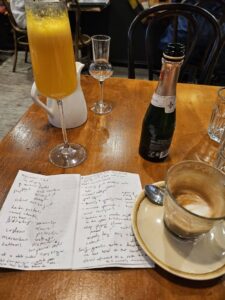 Eugen’s culinary explorations and research
Eugen’s culinary explorations and research
MVU: Thank you so much for joining us today! Can you let our readers know what fun projects you’re working on at the moment, or any upcoming publications to look out for?
CER: I’m trying to finish a novella about a woman who gets up every night to tend to her crying baby, the baby nobody else can see. Because the baby’s not there—or is she?
I’m enmeshed in a huge history project for a university college, which is taking up much of my writing time, so currently my fiction-writing is mostly short pieces aimed at the marketplace.
EB: I am stoked about A Place Between Waking and Forgetting, out this September by Raw Dog Screaming Press. It’s an Afro-Irreal collection with a poetic introduction by the esteemed Linda D. Addison, my heroine. It also features my World Fantasy Award finalist story “The Devil Don't Come With Horns.”
Afro-Centered Futurisms in Our Speculative Fiction is an edited anthology of creative original essays infused with futuristic story excerpts by award-winning Afrodescendant writers reflecting on their storytelling, and scrutinizing approaches to futurisms. Out in November 2024 by Bloomsbury Academic. This book is something else.










